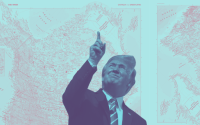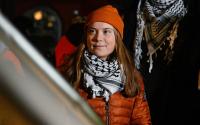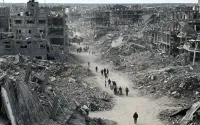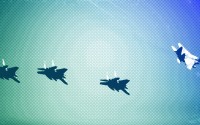January 8 2009
Twenty-three-year-old Sameh A. Habeeb, a photojournalist based in Gaza City, hardly sleeps. The sounds of the bombings keep him awake.
Habeeb seldom leaves his home for fear of being killed by sporadic bombing, but he has slipped out several times to take pictures and to obtain chilling first hand accounts of daily life ever since the Israeli attacks on Gaza began on Saturday December 27.
During the days, his main priority is to find a place with electricity so he can charge his laptop and connect to the Internet. His goal is to get the word out about what is happening on the ground in Gaza. He works primarily from his phone, calling up a number of sources, from doctors to media contacts to human rights workers.
Habeeb is one of few local journalists in besieged Gaza who are attempting to reach out to international media outlets by way of the Internet and the phone. "I'm not sleeping so you are welcome to call me on this number in the night," says one of his blog notes.
Aware that mainstream media have fallen short of reporting on the crisis, in part because international reporters have been banned from entering Gaza but also due to political biases, he has been issuing daily reports of the situation. The reports can be found on his blog, on his Facebook account and on arabisto.com.
Habeeb was born and raised in Gaza, and has worked in civil society for many years. He has also worked as a journalist at the Ramattan News Agency, a regional media facility based in Gaza. He has offered his journalistic work to various organizations worldwide for free.
The young journalist is currently confined to his home with his three sisters, his two brothers, his parents and his grandmother with barely any food.
During the interview below with the Indypendent, Habeeb speaks from his phone over the sound of persistent bombing that he has grown used to. "Can you hear that one?" he says. Boom. Boom. "That was an F-16 [bomb]. I know how an F-16 sounds. I can distinguish what types of bombs they are."
His voice trembles a little, but he goes on speaking, even after being asked if he would like a moment to collect himself. "You know that I can speak and that I will speak at whatever hour and in whatever situation," he says, resolutely.
It is almost 1 a.m. in occupied Palestine.
Zahra Hankir: What is the current humanitarian situation on the ground in Gaza?
Sameh A. Habeeb: If we counted the things that are missing and that we need, we would not finish [this interview]. There is no bread. There is no sugar. There is no gas. There is no fuel. There is no electricity and there is no wood. There is no cement. Everything you can imagine, we do not have. And this was a problem that started with the blockade and that has accentuated since the attacks began. It was preplanned. It is not only a matter of a rocket being fired here and there. It is a strategy that Israel has followed.
As for daily life, and the humanitarian situation, Israel is telling the world that they are not allowing a humanitarian crisis [to unfold] in Gaza. [Israeli foreign minister] Tzipi Livni is a big fool, because she is trying to convince the international community and those working on the Palestinian cause that Israel is helping with the humanitarian situation. But on the ground, she is allowing a big catastrophe to continue. Gaza was in need before the siege. During the siege, Israel was allowing some 40 trucks carrying basic commodities (cans, goods, etc) in. Now, at the time while the war is taking place, they say they are allowing commodities to move in, but they are allowing nothing in! Thirteen trucks with commodities are not enough for a population of a million and a half. They say they opened the crossing, and that everything is okay, but this is a big lie.
Some houses do not have water, as power is needed. Israel has targeted many wells of water in the middle of the Gaza strip, and a well that was in the north. Add to that the coastal authorities were saying that Israel was not allowing them to bring materials to purify water…
Tomorrow, I will be visiting one of the doctors at al-Shifa hospital to investigate the types of weapons that are being used.
As for the medical situation, since the beginning of the siege, around 270 people died because they were not able to leave Gaza for treatment, or were not able to get medicine during the blockade. Medical machines and equipment were also not available, as well as spare parts. Today, there is a very big problem in hospitals because of this. Hospital management has called medical students in their senior, second or third level to help at the hospitals.
ZH: What has been the general attitude of Palestinians in Gaza towards Hamas?
SAH: The main concern for the Palestinian people now is how to find food, how to light candles, how to keep warm. They do not think much about politics. Generally, support for Hamas is still there, and the decisive battle would be proving whether Hamas will have support or not as it still did not [attack] "hot" areas.
ZH: What is your current living situation?
SAH: I live in Gaza City, two kilometers from the Israeli borders. Since the beginning of the blockade, which was imposed 20 months ago, and since the beginning of the war, my life has been turned upside down. There is no gas. No power. No Internet. I charge my laptop by going here and there to get Internet, but generally, there is no fuel, no gasoline, and no oil. In the humanitarian aspect, we do not have anything now. Today I wanted to go to the market to bring home some food. Thank God, I did not go; there was a massacre from artillery shells. Israelis hit the market -- the busiest mark
It was totally closed, and this is part of the Israeli media blackout. We have a huge media blackout in our work, in addition to conditions of panic and fear. We don't have the freedom to report and write. We are not being accessed by many international media outlets. People have tried to call many times but have not been getting through; this shows that Israel has destroyed part of the telecommunication for mobiles. Only landlines are working. Besides, we don't have access to Internet, which is crucial.
ZH: Do you feel that there is a lot of pressure on local journalists to get the truth out?
SAH: I feel that my country needs national human resources. I don't depend on other media sources, I have my own way. Yes, it's almost like a burden to report in such harsh conditions. But I still do it. I report for the people.
ZH: How do the Palestinians perceive the response of the Arab states?
SAH: Perceptions are generally still the same. We're not too aware of what is happening around us [in the Arab world]. But Palestinians do not depend on outside powers. Some here do feel that the Arabs played a part in besieging Gaza, specifically Egypt, and the issue of the tunnels and the Rafah Crossing, which is still closed and [Mubarak] is not opening it. Also, there are other Arab regimes that are not helping the Palestinians and are not working enough. It is clear that the Palestinians were frustrated with Arab countries, particularly at the beginning of this war, when they [the Arab nations] could not even agree or set a time for when to hold an emergency Arab summit.
ZH: How have things changed since the ground operation began?
SAH: Before now, we thought that military operation would end by Sunday. Now it is harder for us to adapt to the new reality [the ground invasion]. We are confined to our houses, are not able to go to the market to bring supplies, we have no access to banks. All our assets are being paralyzed by this situation.
ZH: Would you say Israel is targeting Hamas areas specifically?
SAH: No. Hamas militants are still firing rockets! That is still going on. The number of those innocent civilians who have died debunks arguments that the Israeli army is not allowing civilians to be casualties in the Gaza strip. We can tell what type of rockets they are using, and prohibited weapons. There are cluster bombs. The artillery shells were exploding before reaching the ground.
ZH: What media are you following, if any?
SAH: While we had power, I was following CNN, but I knew that it is not so neutral. As for now, we only have local radio stations.
ZH: Would you say that this is genocide?
SAH: Yes. The big number of victims indicates that this is genocide. Israel says it is attacking Hamas, but on the ground, we are seeing that most of those killed are civilians. The world has to realize and has to know that Israel is not doing as it says -- fighting Hamas and terror -- and that this is part of the media blackout of Israel. As the days pass, the crisis will become much worse. More people will have less access to basic needs.






